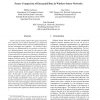Free Online Productivity Tools
i2Speak
i2Symbol
i2OCR
iTex2Img
iWeb2Print
iWeb2Shot
i2Type
iPdf2Split
iPdf2Merge
i2Bopomofo
i2Arabic
i2Style
i2Image
i2PDF
iLatex2Rtf
Sci2ools
126
click to vote
WIOPT
2005
IEEE
2005
IEEE
Secure Comparison of Encrypted Data in Wireless Sensor Networks
End-to-end encryption schemes that support operations over ciphertext are of utmost importance for commercial private party Wireless Sensor Network implementations to become meaningful and profitable. For Wireless Sensor Networks, we demonstrated in our previous work that Privacy Homomorphisms, when used for this purpose, offer two striking advantages apart from end-to-end concealment of data and ability to operate on ciphertexts: flexibility by keyless aggregation and conservation and balancing of aggregator backbone energy. We offered proof of concept by applying a certain Privacy Homomorphism for sensor network applications that rely on the addition operation. But a large class of aggregator functions like median computation or finding maximum/minimum rely exclusively on comparison operations. Unfortunately, as shown by Rivest, et. al., any Privacy Homomorphism is insecure even against ciphertext only attacks, if they support comparison operations. In this paper we show that a p...
Related Content
| Added | 25 Jun 2010 |
| Updated | 25 Jun 2010 |
| Type | Conference |
| Year | 2005 |
| Where | WIOPT |
| Authors | Mithun Acharya, Joao Girão, Dirk Westhoff |
Comments (0)

